- Home
- Roddy Doyle
The Dead Republic Page 2
The Dead Republic Read online
Page 2
—Nope.
—Then probably not.
—The Iron Horse, he said.—I made that picture.
—No.
—You didn’t see that one?
—No, I said.—Or if I did I don’t remember.
—Fairbanks is dead, he said.—They’re called talkies.
—What are?
—Pictures with sound. The worst thing ever happened to the picture business - fucking sound. Watch.
It was supposed to be Dublin, in 1920. A thick-looking lad called Gypo had been turfed out of the Organisation, which I guessed was the I.R.A. I didn’t catch the reason why he’d been expelled. Then he informed on his pal, Frankie, for twenty quid. He went on the batter and spent it. And that was it, till they caught him. It was Dublin, but there wasn’t much that brought me back. None of the corners or accents were real. And some of it was just ridiculous. There was a bit at the start, a flashback, where Gypo and Frankie, old comrades and pals, stood at a bar, singing and drinking, with rifles on their backs. All through the film the lads in the trenchcoats were afraid that the informer would point them out. But they still brought their rifles when they went out for a few pints. It was full of things that made no sense at all.
But it sucked me in. I watched and I cared. Gypo’s girl reminded me of Piano Annie, the woman who’d taken me in after I’d escaped from Richmond Barracks, in 1916. She didn’t look like Annie, but there was something that was right. Her voice wasn’t Annie’s, but she looked at a poster in a window, £10 to America, and the eyes, just then, were Annie’s. I wanted to go back there and hold her, to send my hand through the projector light. I wouldn’t have wasted the money like Gypo, I wanted to tell her. I’d have got her the ticket to America.
The lads in the trenchcoats weren’t the real thing, the ones who spoke, but the faces around them in the shadows were good, all the certainty and fear. I liked the fog and the blind man who came tap-tapping out of it. I kept telling Gypo to keep the money in his pocket, to go easy on the juice, to rescue himself and Annie. But I loved the way he threw it around, bought drinks and chips for everyone, and left a trail that, back in Dublin in 1920, would have had him dead in five minutes. I loved his face, and the question he asked that stunned me - Isn’t there a man here who can tell me why I did it? - the question so real I thought I’d asked it myself. I liked how he smiled and grimaced, and tried desperately not to be stupid. And I liked how he died, how he carried the bullets across the street and into the church, to Frankie’s ma - Frankie, Frankie, your mother forgives me! For fuck sake. He held out his arms, like your man on the cross, and dropped dead. I knew it was over, but I was hoping he’d get up.
I knew what it was that had shaken me. The music. The songs. The Rising of the Moon and The Minstrel Boy - they were rippling right through the film. I’d always hated them; I thought I had - but I was all set to die for Ireland. The film was over, the music gone with it, but I needed a minute to become an old man again.
It was still dark, and darker now that the projector was off. Ford sat, waiting. He’d lit a cigar; I could hear him sucking away. He sat low, well back in his chair. I heard him creak.
—Well? he said.—It’s a good one.
—Yeah.
—Hell of a story.
—Yeah.
—You liked it.
—Yeah.
There was silence then. (I’d learn; there’d be a lot of silence.)
—You didn’t like it, he said.
—I did, I said.
—No.
I knew the tactics. I’d just seen them done badly in the film. I’d been interrogated before, many times, so I knew what was happening now.
—I don’t think so, he said.
I didn’t answer.
—What did you like? he said.
—Ah, fuck it, I said.—Most of it. The story and Gypo, and—
He slapped his leg with his hat, like Gypo would have done in the film.
—I got it right, he said.
—Got what right? I asked.
—Well, the time and the place, you fucking rebel.
—No, you didn’t.
There was more silence. I could see something white - a handkerchief. He was chewing a corner of it.
He stopped.
—But you liked it? he said.
—Loved it.
—Jesus. Why?
—Well, I said.—I haven’t seen a film in years.
He laughed, and the light went on - both exploded at the same time. I could suddenly see him slouched there, his chin inside his collar, and he was laughing. The woman who’d turned on the light sat down on a folding chair behind him. The projector was between me and her, but I saw paper on her lap and she held a fat pen over it. Her name was Meta Sterne.
—Great, he said.—Great. So, where did I get it wrong? With me, Meta?
He didn’t turn as he spoke to her. The hankie was gone, back in his pocket.
—With you, Pappy, she said.
—Great. Take it down as he says it.
I was still being interrogated.
—Great, he said, again.
I couldn’t see his eyes behind the dark lenses. I wondered how he’d even managed to see the film.
—I got it wrong, he said.
—It’s good.
—Fuck good, he said.—Fuck great. I know it’s good. I got a goddamn Academy Award for that picture. It’s a good picture. But I didn’t get it right. You were there, in 1920. Right?
I nodded.
—You were one of those guys.
I nodded.
—You were the leading man.
—I was never a fuckin’ informer.
—But you were there. In the fucking thick of it. I’m right?
—Yeah.
—So, what’s wrong - what’s not accurate about my picture?
—Most of it, I said.
—Get that, Meta? he said.
He lifted his head slightly and spoke to a high corner of the room.
—I got that, she said.
—Most of it, he said.—That’s a son of a bitch. Too late now. I made that picture in - when did I make that picture, Meta?
—1935.
—1935. Thank you. So, Henry. Let’s approach this differently. What’s right about it?
—The trenchcoats.
—Got that, Meta?
—Got it.
—We’ll bring in the trenchcoats, he said.—Hundreds of ’em. This is great. What else?
—The doorways.
—They took you back.
—Yeah, I said.
—Trenchcoats and doorways. Guys in the doorways, collars up. Great.
He sat up, a bit.
—I’m being serious, Henry, he said.—We got to get this right. What else?
—Well, I said.—That time near the end, when they’re all picking matches to see who’ll have to shoot Gypo, and your man picks the short match.
—That was good.
—Not at all, I said.—It was shite.
—Get that, Meta? Shite. Do not omit the e.
—Don’t worry.
—I mean, it was good, I said.—The story. The look on his face. The fear there. It was spot on. Because most of them were amateurs. They were terrified.
—Not you, though.
—Collins had a name for it. When you were going out to put a bullet in someone.
—I knew him, he said.
—He called it a no-come-back job. And that was good, in the film. Your man’s face.
—The face, Meta.
—Got that.
—Yeah, he said.—I knew Mick Collins. I was there, you know, in ’21. On the boat, when he came back to Dublin with that Treaty. I was on that goddamn boat.
I said nothing to that.
—Picking the matches, he said.—What was wrong with that?
—The choice, I said.—There was never a choice.
—How did it happen?
—It was a fuckin’
army. You were given the order, not a box of matches.
—Right.
—I’d be given a name, I said.—On a piece of paper. And that was it, you just did it.
—Shot the guy.
—Yeah.
—Paper, he said.—Slid across a desk, right?
—Sometimes.
I was doing more talking than I’d done in years.
—See there? he said.—What do we need the fucking talkies for? That says everything there. Piece of paper sliding across a dark-wood desk. Upside-down?
—Sometimes.
—A death sentence, he said.—A no-come-back job.
He creaked again. He was sitting up.
—I love it.
He was assembling the story, starting the job. I understood that then.
—What about the paper? he said.—After you read the name. Burn it?
—No.
—What did you do with it?
I knew he’d like this.
—I slid it back across the desk.
—Beautiful, he said.—The eyes. The fingers.
He lifted his glasses. He leaned out of his chair. He looked at me properly. He let me look at him. The eyes were gentle blue, a kind man’s eyes, much younger than the surrounding skin and creases. But he couldn’t see me. Without the glasses, he was blind.
—I knew it, he said.—Two fucking rebels.
His grin was huge and brown; it threatened to demolish his face.
—We’ve got a picture here, Henry, he said.—There’s one more in the old man. It’s a hell of a good story.
That was the start of it. And it went on for years.
3
I had a new leg one day. It just arrived, at the end of my stump; I’d no memory of buying or being given it. I left the room and went right out, to give it a go. The leg was light; the straps were soft and soundless. I could move without hauling it after me, leaning out to drag it ahead, waiting till it landed clean and I could go on and take the next step.
I was the only man on the street. There was life behind the walls and windows but the street itself was deserted. I didn’t know where I was. I’d no street or hotel name - I knew I’d just been in some sort of hotel. I’d walked straight out, into white sunlight; I was crossing the same street into shade. I stepped onto the sidewalk, no bother, no real determination needed. I looked out from the shade, back the way I’d just come, into the glare and shimmering air. I saw, far off, where the hotel was, a figure, someone on the street. Male or female - I couldn’t tell. But I thought - I hoped - it was a woman. And that hope was a feeling that just opened its eyes and stretched. I kept looking. I liked being in the shade. I liked the feeling on my back, like reassuring hands. The figure got no bigger; no shape or colour was added. I stood there for a while, until the figure had faded to nothing, and no other figure replaced it. I could stand there; I had the strength to do that. The leg was already my own. I knew what I was doing.
Then there was fuck-all.
I was in a car. I was sitting in the back. The driver was talking to me. I saw his eyes in the rear-view mirror. I’d been in this car before. I’d seen the eyes.
—It took a while, he said.
His name was Bill. I knew that.
Another of those long streets. There were no real corners in this place.
He was Ford’s driver.
I was in Ford’s station wagon.
—Where are we going? I asked.
—Mister Ford’s place, said Bill.
—Where’s that? I asked.
—It’s at Odin Street.
It meant nothing.
—Have I been there before? I asked.
—Think so, said Bill.
—Did you bring me there?
—I think so, he said.—Yes, sir.
His eyes were on me again.
—Three, four days ago, maybe, he said.—It took me a while to find you this time.
—Where was I?
—Where we just came from.
—Where was that?
—Well, Christ - excuse me - that was your new hotel. The Elsinore.
—New hotel, I said.—New?
It had happened before. I’d gone missing, more than once. And this guy finding me; there was a routine. But the curiosity was new. The collapse of proper time was getting on my wick and I didn’t like the stupid man it made me.
—That’s right, he said.—New. I’d never looked for you in that particular establishment before.
I saw his eyes. He didn’t look surprised or spooked.
—Like I said, said Bill.—It took a while to find you. To figure out what happened.
—Tell me.
—Well, he said.—They wouldn’t let you back into your hotel. Remember?
—No.
—Far as I can make out, you went out for a stroll.
—Yeah.
—You remember?
—Yeah. When was that?
—Two, three days ago.They weren’t sure.You remember coming back?
—No.
—You had a few under your belt, I guess.
—No.
I saw him nod.
—They wouldn’t let you back in, he said.—The hotel people there.
—Why not?
—Said you didn’t look like the type that would be a paying guest in their establishment.
—But I’d already been there.
—That’s right.
—The fuckers.
—That’s about the size of it, said Bill.
—Did they not see me going out?
—Well, said Bill.—That’s Los Angeles, I guess.
I could still see his eyes. He wasn’t smiling.
—There’s a world of difference between getting in and going out, he said.—Going out is something you can do for yourself. But getting in?
—I’m with you, I said.—It’s the same everywhere.
I knew what I was talking about. My life was there to back me up.
The room was dark. The cigar glowed, and faded. I heard him shift the butt across his mouth. But he didn’t speak.
I’d been there before. I knew it when Bill the driver brought the station wagon up the drive. And in here - I’d been in this dark room before. This time the smell reminded me of something, a jail cell. The old breath, and the leaks of a man who’d been locked up for a long while.
The cigar was red again, and faded.
I didn’t move. He was blind but he’d be watching. He wasn’t going to get the better of me.
The cigar was red again. He muttered words too dry and broken to catch.
I heard legs crossed, but not in front - beside me. They weren’t Ford’s legs.
Meta Sterne’s glasses caught a fragment of the light that tore at the edges of the window blinds.
—Good afternoon, she said.—Pappy’s glad you’re here. Pappy could go and fuck himself.
—That’s great, I said.
—There’s a chair beside you, she said.
—Grand.
I was rusty. She’d been there all that time. I hadn’t even considered the possibility that there might be someone else, besides myself and Ford. Thirty years before I’d have been dead for that, or she’d have been.
A click - she’d turned on the light beside her.
I didn’t blink. I sat in front of Ford. His head was hanging. There was white cake on the corners of his lips. He was wearing one of those bathrobes. It was manky, and his bare legs were yellow and shining.
He muttered. His tongue went out, and in.
The Sterne woman held her pen ready.
He’d been that way the last time I’d been there, sitting in the same chair, with the woman to my left. I’d done this before; he’d been drunk for weeks. But her presence beside me had still been a surprise.
I locked my eyes on the black lenses and the eyes behind them. I watched his tongue wetting his lips, again and again. I remembered what I’d told him the last time I’d been there. About
my wedding and the photograph and the few guarded hours in the middle of the war. He’d loved it; he’d forgotten he was drunk.
I waited.
Meta Sterne leaned out of her chair. She spoke quietly.
—Pappy says Thank you.
There was no hint of sadness on her face, or malice. She was simply giving me the message.
I stood up and walked out.
There was a hat on the table beside the front door. It was one of the slouch hats Ford liked wearing. It would do till I found something better.
I walked past the station wagon.
—Mister Smart?
It was Bill the driver.
—Mister Smart?
I kept going.
Pappy says Thank you. There was an evil little fucker hiding inside Pappy. But I was grateful to him, and not because he’d hauled me out of the desert. He was making me angry; he was making me think.
I was out on the street now. Somewhere. Under palm trees and a high sun.
The anger felt like fingers, straightening me, pulling and prodding me into shape. Ford could find me if he wanted. I wasn’t on the payroll.
I didn’t even know if that was true. I hadn’t thought about it, until now. I had the new leg. I had a room, in a place called the Elsinore. I checked my pockets. I had six paper dollars and some change. I hadn’t a clue where I’d got it. I was on a street with no sidewalk, wearing another man’s hat.
I sat on the bed. The room was hot. I could feel the hat, a band around my head. I took it off. It was a fedora, brand new. It wasn’t pearl-grey. But it was mine. I was sure of it.
I looked around the room. There was no one else there, and nowhere to hide. It was the bed and a chair, a window and the door.
The knock didn’t surprise me.
—Mister Smart.
—This is the Elsinore.
—Sure is, he said.—Nice hat.
—Thanks.
—Ready?
—Lead the way.
—Eaten?
—Not in years, I said.
—You don’t eat?
—No.
He left it at that.
I felt it as I walked across the empty lobby; I knew where I was. I knew that Bill would have to pull the door, not push.
The station wagon was right outside.
—Well, sir, said Bill.—Mister Ford is looking forward to talking with you.
—Yeah.
He got us moving.

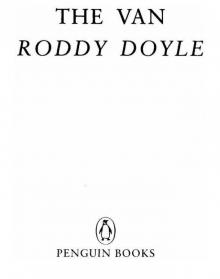 The Van
The Van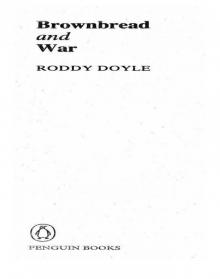 Brownbread & War
Brownbread & War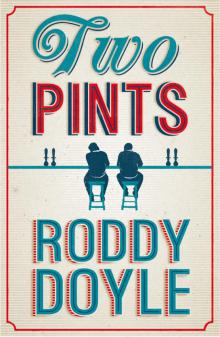 Two Pints: A Collection
Two Pints: A Collection Rover and the Big Fat Baby (Giggler 4)
Rover and the Big Fat Baby (Giggler 4)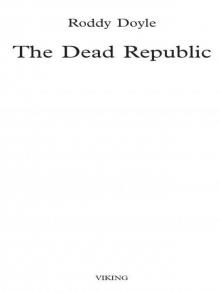 The Dead Republic
The Dead Republic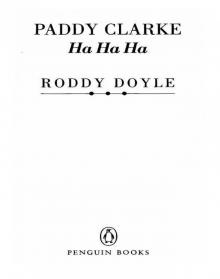 Paddy Clarke Ha Ha Ha
Paddy Clarke Ha Ha Ha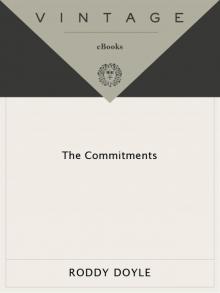 The Commitments
The Commitments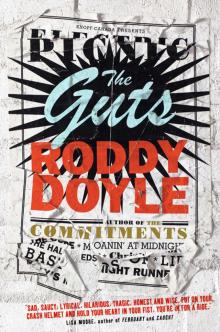 The Guts
The Guts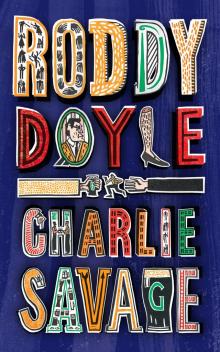 Charlie Savage
Charlie Savage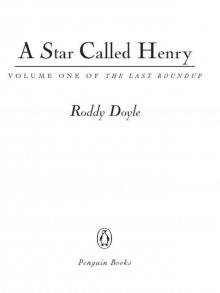 A Star Called Henry
A Star Called Henry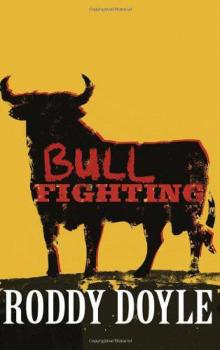 Bullfighting: Stories
Bullfighting: Stories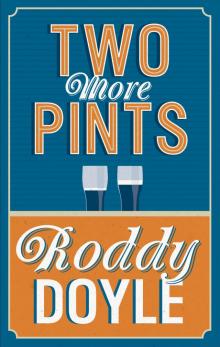 Two More Pints
Two More Pints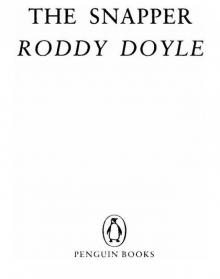 The Snapper
The Snapper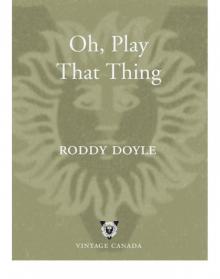 Oh, Play That Thing
Oh, Play That Thing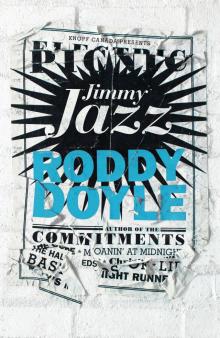 Jimmy Jazz
Jimmy Jazz Paula Spencer
Paula Spencer Wilderness
Wilderness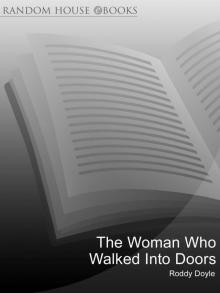 The Woman Who Walked Into Doors
The Woman Who Walked Into Doors The Deportees
The Deportees Rover and the Big Fat Baby
Rover and the Big Fat Baby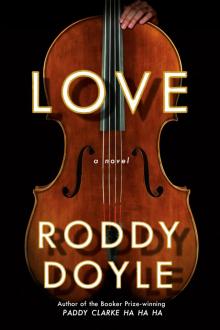 Love
Love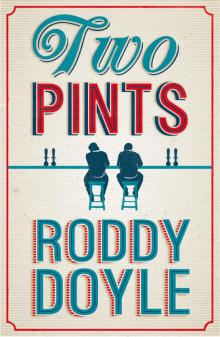 Two Pints
Two Pints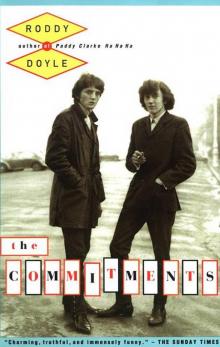 The Commitments b-1
The Commitments b-1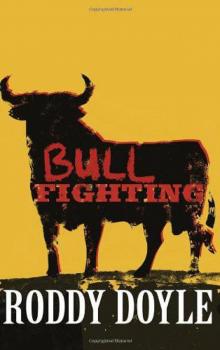 Bullfighting
Bullfighting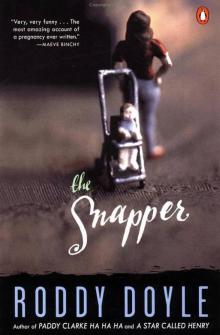 The Snapper b-2
The Snapper b-2